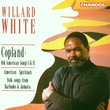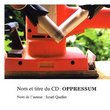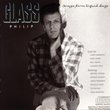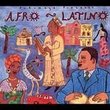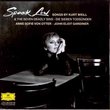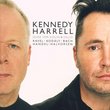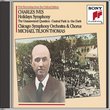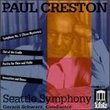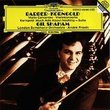| All Artists: Philip Glass, Robert Shaw Title: Philip Glass: Itaipu; The Canyon Members Wishing: 1 Total Copies: 0 Label: Sony Release Date: 6/29/1993 Album Type: Original recording reissued Genre: Classical Styles: Opera & Classical Vocal, Historical Periods, Modern, 20th, & 21st Century Number of Discs: 1 SwapaCD Credits: 1 UPCs: 074644635225, 2605000021628, 074644635287 |
Search - Philip Glass, Robert Shaw :: Philip Glass: Itaipu; The Canyon
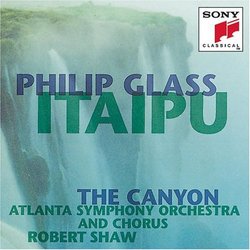 | Philip Glass, Robert Shaw Philip Glass: Itaipu; The Canyon Genre: Classical
Itaipu (1989) is something of a cantata-cum-symphony-cum-oratorio with no clear text. Its topic is the world's largest hydroelectric dam, built on the Rarana River between Paraguay and Brazil, and the piece--in Glass's ... more » |
Larger Image |
CD DetailsSynopsis
Amazon.com Itaipu (1989) is something of a cantata-cum-symphony-cum-oratorio with no clear text. Its topic is the world's largest hydroelectric dam, built on the Rarana River between Paraguay and Brazil, and the piece--in Glass's trademark punctuating minimalism--is filled with distinct South American instrumentation, particularly in the percussion. The music itself is noble, conjuring the human endeavor to build the five-mile-wide dam near the town of Itaipu. The Canyon (1988) is about no canyon in particular but tonally suggests the mystery of canyons in general. Both these compositions are among Glass's better works. --Paul Cook Similar CDsSimilarly Requested CDs
|
CD ReviewsVery lovely, Imaginative, and Creative wellio@wa.freei.net | Seattle | 12/13/1999 (5 out of 5 stars) "Let me start off by saying Philip Glass is a stretch for me. I prefer Mozart, Beethoven, and Wagner...so Glass is quite far from my "main stream" classical tastes.I have a friend who loves Philip Glass and has played several pieces (particularily opera) for me, which I didn't care for and frankly found annoying. I had written Glass off.Then, the Santa Clara Vanguard Drum & Bugle Corps, played The Canyon as part of their 1999 show and won the World Championship with it. It was one of the greatest things, if not the greatest, I had ever heard played by a drum and bugle corps.Therefore, I had to have The Canyon. I went into this thinking I would be buying a cd that is largely not the Canyon and not liking it. Well, this cd is beautiful and Itaipu is quite thrilling in its own right. Very creative and innovative. Like The Canyon, it is very loud at times and thrills with orchestral fire power. The rhythms are odd, repetative, but alter slightly within the passages...very developing from start of finish..especially the Canyon, which builds and changes and builds and changes, on and on. Quite exquisite.This cd has proved that Glass is a worthy composer who will no doubt be heard for centuries to come. Afterall, Mozart was "written off" in his day and now is regarded as the worlds greatest composer.Glass is a new adventure I will undertake. The trick is finding what Glass works for me. Feel free to email me with suggestions or thoughts.Thank you!" World Premire Douglas T Martin | Alpharetta, GA USA | 12/04/2000 (5 out of 5 stars) "The piece "Itaipu" was commissioned by the Atlanta Symphony Orchestra through the generosity of an anonymous patron who specified that the work would be written by Philip Glass, for the ASO, to be conducted by Robert Shaw (a champion of American composers and one of the world's greatest choral conductors). I had been listening to Philip Glass for a few years, mostly "Glassworks", "Einstein", "North Star", and "Mishima", but didn't really consider myself familiar with classical music. I bought season tickets to ensure that I had a seat for the performance (I figured if it was Philip Glass it would have to be a sell-out). The work was not performed that year due to scheduling and rehearsal conflicts so I bought season tickets to the following year. During that time I learned a lot about the standard classical repetoire and learned of the Atlanta audiences' overall resistance to new and challeging works (like booing and walking out of Witold Lutoslawski's 3rd Symphony - at least in the cheap seats). I didn't know how the world premire of "Itaipu" would be received but the audience seemed to appreciate the work, with much applause given to the orchestra, chorus, Robert Shaw, and Philip Glass who was in attendence. This was the largest orchestra that Glass had written for, with a massive percussion section and a chorus that filled the stage - probably the most musicians I have ever seen on any stage. "The Canyon" received its North American premire a year later in Atlanta by the ASO under the direction of William Fred Scott. Both the majesty of "Itaipu" and the starkness of the percussion-laden "Canyon" are beautifully captured on this recording by Robert Shaw and the Atlanta Symphony Orchestra and Chorus.A heartfelt thanks to the anonymous patron who brought this challenging work to Atlanta. As a concertgoer behind me commented "Well, I liked it but Atlanta's more of a Beethoven town."" A work of magnificent scope and depth Penumbra | Atlanta, GA USA | 07/31/1999 (5 out of 5 stars) "In my opinion Glass has captured the sense of awe that one feels contemplating Itaipu itself. This is a work of massive proportions much like the creation of the Itaipu dam, which Glass feels an "undertaking comparable in daring and inventiveness to the construction of the Egyptian pyramids." The extensive choral work is written in the language of the Giuranni Indians. Glass often chooses obscure languages for the effect of "distance." People who obsess over the choral pieces of "Carmina Burana" and/or "The Mission" soundtrack, will probably enjoy "Itaipu" a lot."
|

 Track Listings (5) - Disc #1
Track Listings (5) - Disc #1